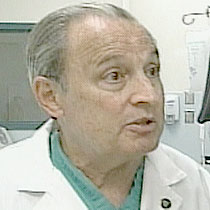2007年VOA标准英语-Experimental Procedure May Let Injured Player W(在线收听)
By Carol Pearson
Washington
13 September 2007
American professional football player Kevin Everett fractured his neck during a game, 9 September 2007. He remains sedated and in intensive care. It is too early to tell if Everett will recover fully. The doctors who rushed to his aid tried an experimental technique that may save his life and even allow him to walk again. VOA's Carol Pearson has more.
It seemed like just another football play, a charge by the Buffalo Bill's Kevin Everett, except for an accident.
In a collision with another player, Kevin Everett, falls to the ground. His fellow players knelt down to pray as Everett was carried off the field on a stretcher. After surgery, a team doctor offered somber words.
Dr. Andrew Cappuccino, team doctor says, "I told Kevin that the chances of a full neurologic recovery were bleak."
 |
| Dr. Barth Green |
Doctors lowered Everett's body temperature within minutes of his injury, preventing the injury from getting worse.
"What they did is they took an athlete that was injured 15 minutes earlier, and they lowered his body temperature within minutes of his injury, and they were able to protect his spinal cord from permanent damage. That was never done before," Dr. Green said.
This technology did not exist 12 years ago, when actor Christopher Reeve was injured. Reeve was paralyzed after falling off a horse. Afterward, he raised money -- and awareness - for research on spinal cord injuries.
"Scientists are already talking about the day when having a spinal cord injury will not result in paralysis," Reeve once said, though he did not live to see that day.
But the foundation he created provides funding for the University of Miami's Project to Cure Paralysis. "Christopher Reeve used to say it's what you do after the accident that matters. That early intervention, to know exactly how to treat the patient is critically important," said Peter Wilderotter, the foundation's president.
As of Wednesday (12 September), the Buffalo Bills' web site said Kevin Everett's injury is still potentially lethal, and it is too early to predict the outcome.
But if Everett does walk again, it will be the result of dedicated medical research.